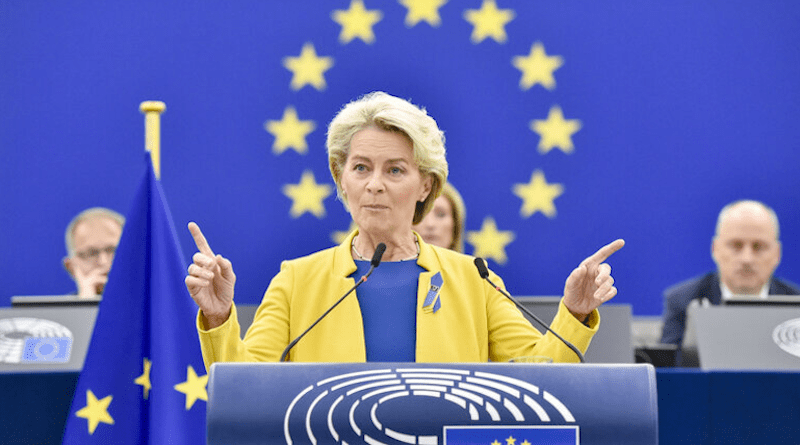EU Socialists, Greens, Liberals Warn Von Der Leyen: No To Hard-Right Alliance
By EurActiv
By Max Griera
(EurActiv) — The European Socialists, Greens, and Liberals have all shut the door to European Commission President Ursula von der Leyen’s reelection if she decides to cooperate with the hard-right ECR party after June’s EU elections.
The parties reacted to von der Leyen’s comments made during the Maastricht Debate of lead candidates on 29 April, where she did not discard collaborating with hard-right European Conservatives and Reformists group (ECR), the political family of Italian Prime Minister Giorgia Meloni and Poland’s Law and Justice party.
“It depends very much on how the composition of the Parliament is and who is in what group,” von der Leyen, the centre-right European People’s Party (EPP) lead candidate said, adding: “It’s the Parliament who makes majorities.”
While a right-wing majority composed of the EPP, ECR, and far-right ID is very unlikely, right-wing forces could collaborate in the next term by trying to block some legislative files, as has already happened in the past with the nature restoration law, among others.
The Socialists, Liberals, and Greens, who will be essential for von der Leyen to secure the majority she needs to be reelected, have sent a warning in response to her ambiguity and stressed they would not sit at the table with ECR.
“We will never cooperate nor form a coalition with the far right! This also means: no cooperation or alliances with ECR or ID in the European Parliament,” said a declaration by the Party of European Socialists (PES), signed by national Socialist party leaders on 4 May.
In a clear challenge to the EPP, the European Socialists are demanding that all parties include the same “formal and unequivocal” commitment against ECR and ID in a “party declaration”.
The Liberals have also voiced their opposition to any deals with the far right.
“I don’t know if she (von der Leyen) will be the candidate for the European Commission, but I have had the opportunity to tell her that if it should be her […] there should be no link, no negotiation with the ECR,” the president of the liberal Renew Europe group, Valérie Hayer, told journalists on Monday (6 March).
Hayer added that, unlike the EPP, she considers Italian Prime Minister Giorgia Meloni to be far-right.
Both the Socialists and the Liberals agree that the traditional “pro-European” majority with the EPP should prevail.
The Greens are hoping to join in and are open to supporting von der Leyen if she sticks to an ambitious climate agenda.
“You can be sure that not only are we excluding forming a majority if the ECR is on board, but we are also going to put pressure on the other groups,” said on 3 May the European Greens lead candidate Terry Reintke, who is also co-president of the Greens group in the Parliament.
A majority with Socialists and Liberals is also preferred by many EPP national delegations, including von der Leyen’s home party, Germany’s CDU, if the other parties “participate in a realistic package in which it is recognised that we are the strongest force,” which “must also be reflected in the content of the compromises,” CDU’s leader in the EU Parliament, Daniel Caspary, said last week.
However, ahead of what is likely to be a very tight vote for von der Leyen in the European Parliament if she is nominated by EU countries – in 2019 she was approved with a nine-vote margin – Caspary also recognised the EPP’s need to be open to alternatives, such as some ECR delegations considered more ‘moderate’, like Fratelli d’Italia and Czechia’s ODS, to reach a majority.
On 21 February, when von der Leyen announced her reelection bid, she said she was ready to work with any force that respects three “red lines”: being pro-European, pro-Ukraine, and respecting the rule of law.
She also highlighted that it is yet to be seen how the future Parliament’s balance of powers will look, mentioning the possibility of some ECR delegations shifting to the EPP.
*Additional reporting by Théo Bourgery-Gonse

